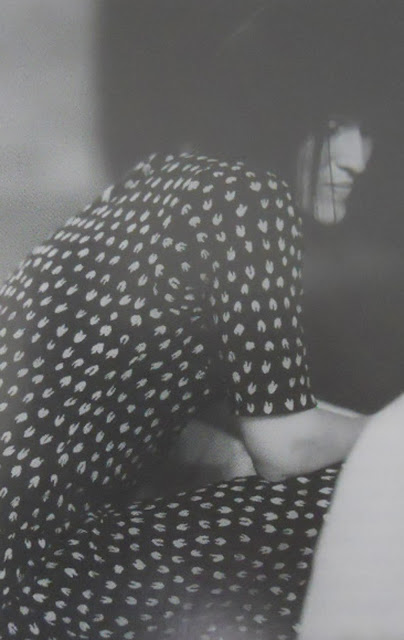Aux Marches du Palais.
A white Alpha from 2006.
Alpha is a record publisher of high visual culture and it is
worth taking our time at the cover. It is a black and white picture; two
figures in raincoats at the distance, blunt contours. As the title says on the
stairs of the palace.
What, anyway? Or who? Perhaps, there are stairs but
everything is in ruin and grey. They sit with their back to us, watch
something, they are together. Nice proportions, a special mood.
The record includes early French songs, ballads and chansons.
Most have astounding stories. There are some which ascended into canon from the
dust of the ground. There are others which let themselves out to free air from
Josquin’s high-art Renaissance polyphony and others which stepped back and
forth between the dandy noble audience and the yammering pub-crawlers.
L’amour
de moy originates from the 1200s and Une Jeune Fillette is such a hit even
today that probably we can hear one variant of it in Petőfi FM radio.
La Fille au Roi Louis is about a girl who was locked in a
tower by her father because she loved a poor knight rather than a man intended
for her… The story is deeply familiar, by replacing some names it could have
happened anywhere.
What is it like musically?
Well, Le Poeme Harmonique starts
this chanson-ballad that it is one of the most beautiful wind-instrument entry
I have ever heard.
The gem of the record is track 11 when we have tuned in this
language and wait for the nice fall or some relaxation, a release. Well, here
comes Le Roi a fait battre tambour… we will get everything but relaxation or
joy.
When the King entered the foyer to greet the ladies, the
first of them was so beautiful that he asked the Marquis who she was, or
rather, whose she was as it was usual the time, and, anyway, he was the king
and could ask anything anytime the way he wanted …
The Marquis said, Your Excellence, she is my wife.
An apparently innocent situation, the women are adorable,
the atmosphere is excellent, the dishes are fine, a fine compliment in the
question.
But people felt the same 500 years ago as we feel today, that is,
unexpected, delightful and horrendous complications are forthcoming. Passionate
love is to continue, then bitterness and white flowers by a coffin.
The music is a precise analogy of the story; follow-up sound
by sound, emotion by emotion, rather than a servile copy as in the Opera 250
years later, but it is gentle, impalpable and full of mirages. As there is an
answer to the question: Sire Roi, c’est ma fémme, the music becomes dark, full
of glitter, and as the story thickens the fine adornments and parts of the
reiterating simple melody develop greater and greater delight.
We clearly feel
that it scrapes the surface of Absolute Beauty.
Language and music behave similarly, loads of meta-meanings
can be felt beyond the words as well as deep behind the melody.
The elocution is like a complicated key turns in a complex
lock.
It is exactly what it should be. Open and straight, full of poise. Claire
Lefilliatre‘s voice is simply gorgeous; it has no self-humiliation or whine; he
lent his tears to us this time.
Beauty almost strikes us.
Human psyche is extremely sensitive to such things even when
the academic explanation would be a mass of empty sheets.
The king, the marquis, the lady, the whole court are long
dead, all of them mouldered, their high-sounding names are forgotten for good,
no one remembers even their grandchildren’s grandchildren. Yet, the chanson
still glitters hundreds of years later, it is still remembered and its
popularity is unbroken.
The characters were tried to be indentified later, Henry VI
and Gabrielle d’Estrees or Henry VIII. and Anna Boleyn, the line can be
continued, completely in vain, just when some regularity is tried to be
enforced onto the tangled infinity of Pi.
3.14159265358979323846264338327950288419716939937510582097494459
230781640628620899862803482534211706798214808651328230664709384
460955058223172535940812848111745028410270193852110555964462294
895493038196442881097566593344612847564823378678316527120190914
564856692346034861045432664821339360726024914127372458700660631
558817488152092096282925409171536436789259036001133053054882046
652138414695194151160943305727036575959195309218611738193261179
310511854807446237996274956735188575272489122793818301194912983
367336244065664308602139494639522473719070217986094370277053921
717629317675238467481846766940513200056812714526356082778577134
275778960917363717872146844090122495343014654958537105079227968
For it is not the number but its behaviour, not the person
but the story is what counts.pi
The story as it is thought by Le Poeme Harmonique and
Vincent Dumestre.
They plant it into our soul to contemplate about it for
days.
We have become more somewhere inside.
Those 21 grams have become a bit more.
Highly, highly recommended.
Translated by Kenesei Andrea
* * *
______________________
Thank you for the images.1-2-3-4-5-6-7







